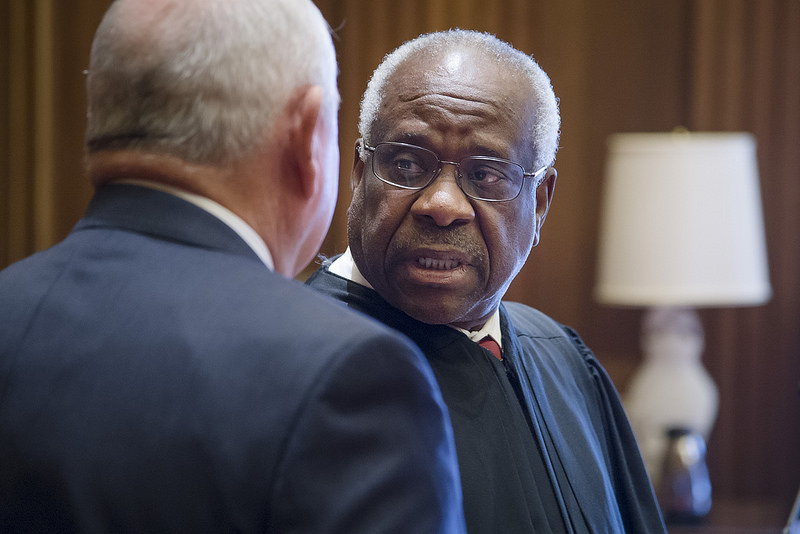
Sonny Perdue is sworn in as the 31st Secretary of Agriculture by U.S. Supreme Court Justice Clarence Thomas with his wife Mary and family April 25, 2017, at the Supreme Court in Washington, D.C.. Photo by Preston Keres
Money – the Heart of the Problem
“All these breathless ‘investigations’ amount to nothingburger concern-trolling of justices whose opinions progressive activists don’t like,” said Ilya Shapiro, director of constitutional studies at the Manhattan Institute and author of Supreme Disorder: Judicial Nominations and the Politics of America’s Highest Court.
The left, continues Mr. Shapiro, “simply can’t stand that a majority of the Supreme Court is finally, after decades of hand-waving, interpreting the Constitution based on what it says instead of nebulous conceptions of social justice.”
At first glance, many of the stories on Clarence Thomas look “pretty bad,” admits Ben Domenech in Spectator.
They paint a picture of lifetime-appointed justices palling around with powerful billionaires who shepherd them on fishing trips and to hunting lodges, take them on vacations to exotic locales and contribute indirectly or directly to supporting their legacies. It’s not a pretty picture. Yet even slightly closer inspection reveals that there are enormous reasons to take the breathless reporting with a pinch of salt.
In an awkward Slate podcast, host Joel Anderson’s first focus is on Clarence Thomas. Anderson begins with his own peaceful version of a home confrontation, writes Ben Domenech.
In “America’s Blackest Child,” he knocks on the screened-porch door of a modest single-story white house on a Savannah street. The ninety-four-year-old Leola Williams, happy to oblige a visitor, welcomes Anderson inside, where he discovers the shocking scene you would expect from any proud Southern mother: pictures of her family, including her son Clarence, covering the walls.
The mother of Clarence Thomas speaks in a lilting language that “sounds like music.” It’s a mysterious linguistic cocktail of English, Creole, and West African, of which experts disagree on its exact origin. Justice Thomas, his mother’s second child, was abandoned by his father when he was two.
The Most Hated Justice
The main focus for this well-funded, well-organized Democratic campaign is to put the Supreme Court under siege — not just in the press, but in the public too.
… many on the left seem to like it that way. If you can’t transform the judiciary through the process of government, transform it by making it a job people are afraid to take.
Money is central to the left’s story about Thomas, specifically, and the Supreme Court in general, explains Mr. Domenech.
As is this little white house in Savannah. A ProPublica investigation revealed this spring that billionaire conservative Harlan Crow bought the property from Thomas and his family several years ago.
About That House in Georgia:
Crow, according to a spokesman, wants to ultimately turn Thomas’s childhood home into a museum, “telling the story of our nation’s second black Supreme Court justice.”
Thomas’s share of the sale was a third of $133,000, and it’s still not entirely clear if he even reported it incorrectly, though he reportedly intends to amend it as necessary.
Slate had on as its first guest RI Senator Sheldon Whitehouse, infamous for his membership in an all-white Rhode Island beach club.
The Senator is now promoting his book, The Scheme: How the Right Wing Used Dark Money to Capture the Supreme Court, where he describes “an evil spiral back and forth” bent on the “court capture” of the judiciary.
At a friendly D.C. crowd, there is little subtlety in Senator Whitehouse’s comments about the degree to which the activity swirling around the Supreme Court is an ideological information operation.
Democratic politicians have all the reason in the world to promote the effort to do so: the biggest funders of their partisan priorities are all paying for it.
Whitehouse and his fellow leftists would do anything to alter the conservative course the court has taken in recent years — even radical steps like court-packing. In the fall of 2019, along with four other Democrats on the Senate Judiciary Committee, Whitehouse sent a brief to the court on a New York gun rights case. “The Supreme Court is not well, and the people know it,” they warned. “Perhaps the court can heal itself before the public demands it be ‘restructured.’”
Why, wonders Mr. Domenech, don’t Democratic billionaire donors – including George Soros, Pierre Omidyar, Laurene Powell Jobs, Donald Sussman and until it was compelled to return the first tranche of a $5 million donation, notorious crypto bro Sam Bankman-Fried – raise the hackles of Messrs. Whitehouse or Anderson?
Clearly, justices of many stripes have long proceeded by the ethics rules as they stand, including justices RBG, and Alito.
If you’re willing to fight for Main Street America, click here to sign up for the Richardcyoung.com free weekly email.




